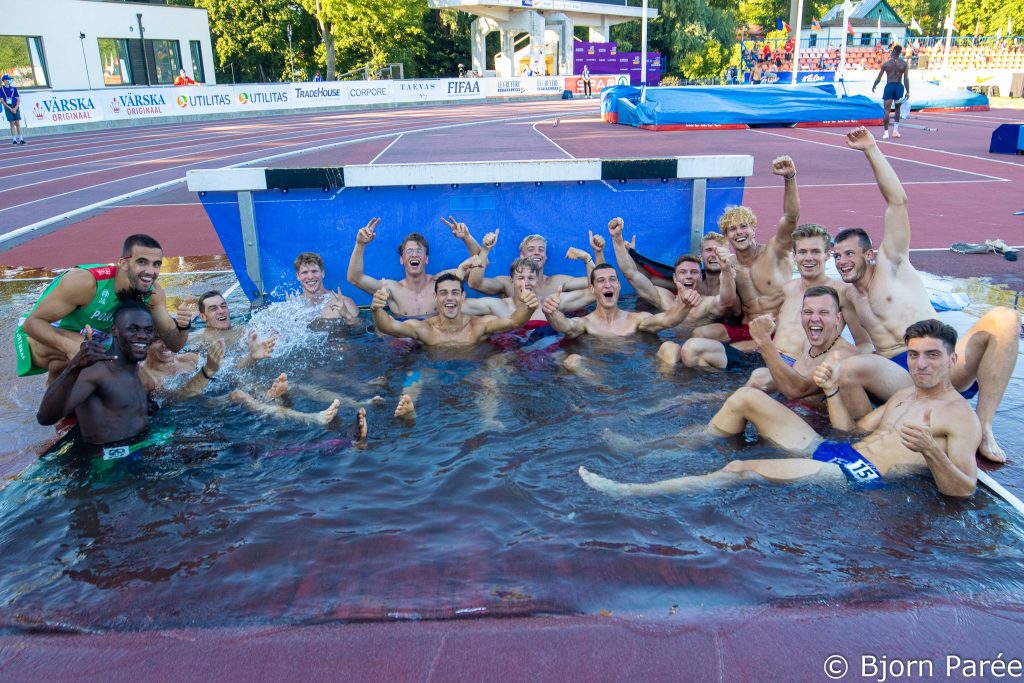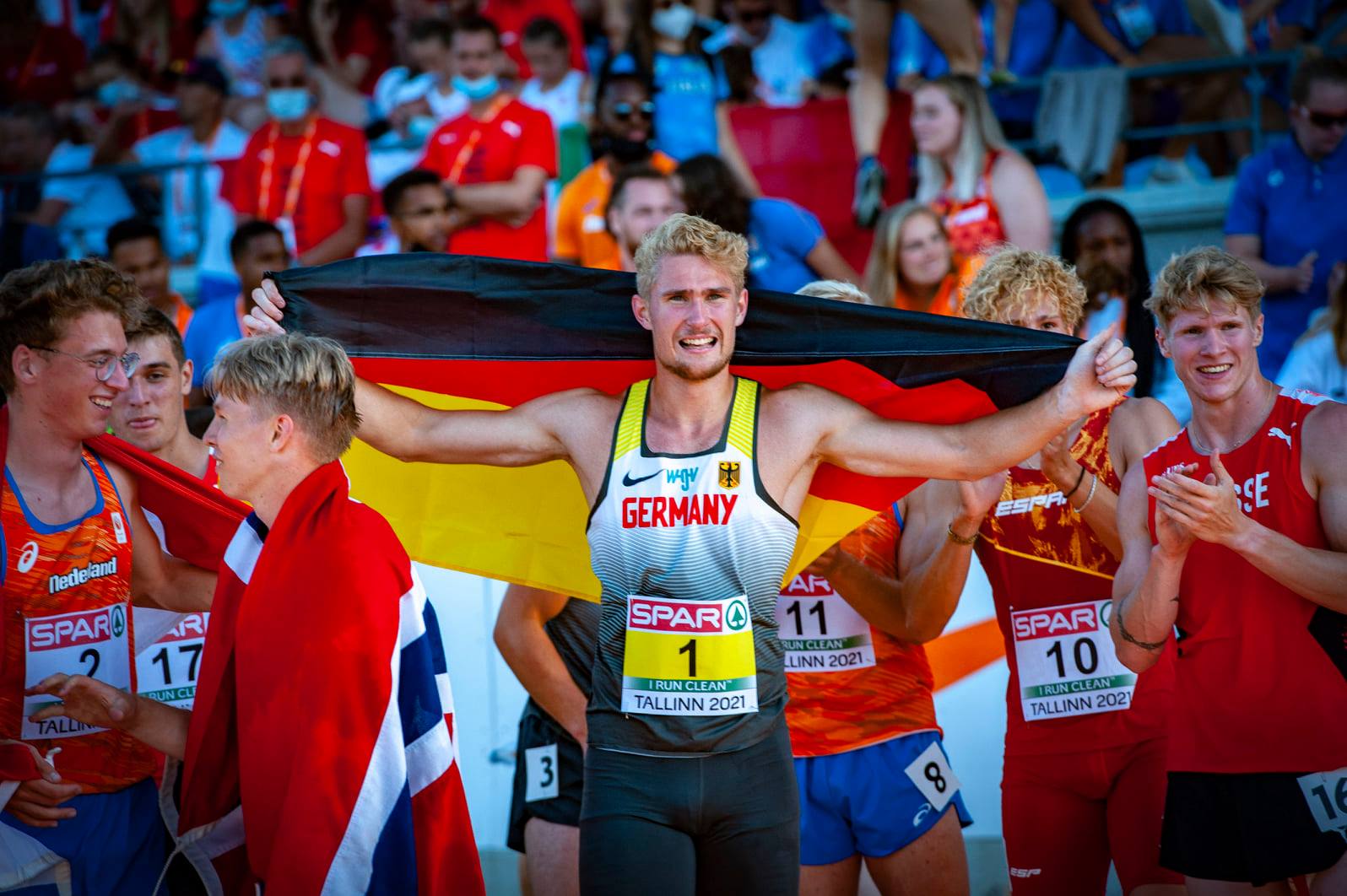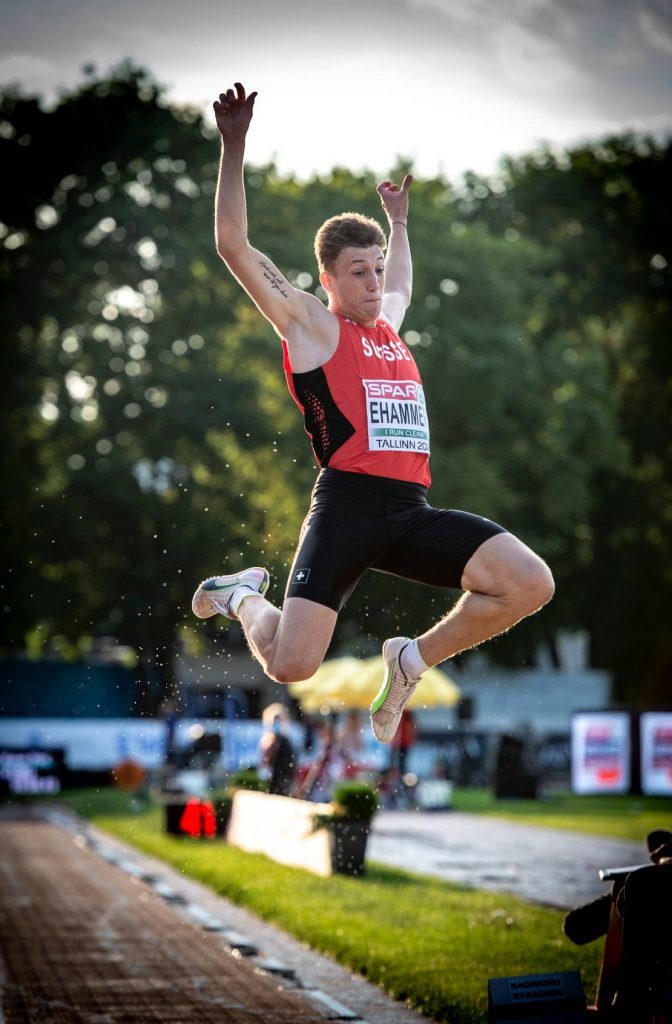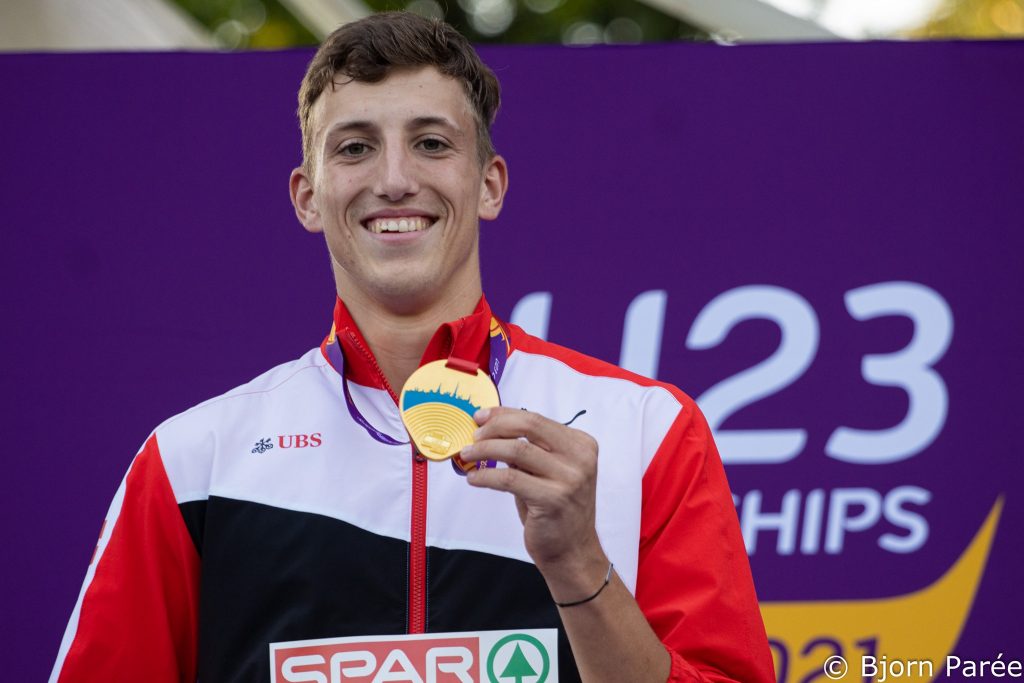HEPTATHLON
When we left the heptathlon at the end of Day 1, Adrianna Sułek had a lead of 150 points over Holly Mills, largely as a result of Holly’s lower than usual high jump of 1.72. Had she equalled her season’s best of 1.85, Mills would have been in the lead.
As the best long jumper in the field, it was no surprise to see Mills leap to the longest jump of the day on Day 2 with 6.20. But 3 women were right behind her on 6.19: Latvia’s Kristine Blaževica, France’s Auriana Lazraq and, ominously, Spain’s Claudia Conte. Conte had been 135 points behind Mills, in 4th place, overnight and she held that to 139 points after the long jump, with her much stronger javelin to come. Mills in turn reduced the gap between herself and Sułek to only 97 points.
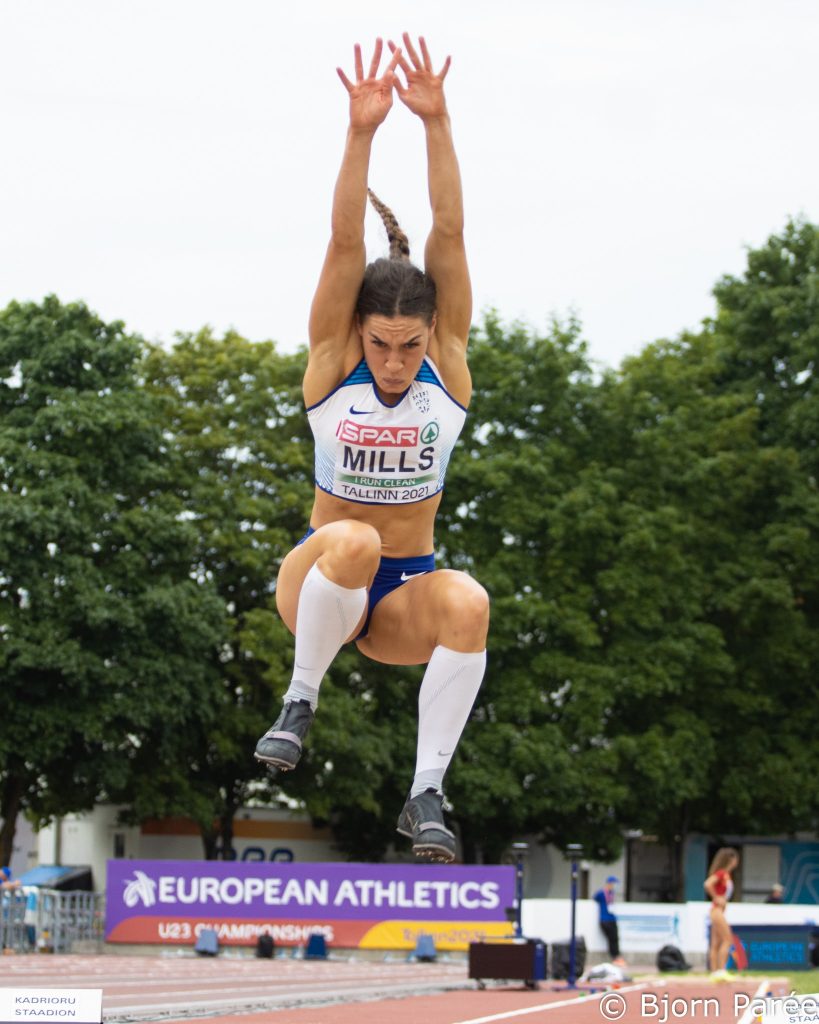
Meanwhile, Léonie Cambours, who was third overnight, registered the dreaded no-mark. As one of the biggest jumpers she would have hoped to build a buffer before her weaker event, the javelin, but had been struggling with injury. Jade O’Dowda was the next best jumper after the trio at 6.19, with 6.14, which allowed her to move into 5th after Cambours’ demise.
Going into the javelin, since Sułek and Mills had similar 800 PBs of 2:10, Sułek just needed to maintain her points gap back to Mills, ideally extending it a little.
Sułek and Mills were in the first group to throw, and Mills had a series of 35.49, 36.79 and 37.38, the latter two lifetime bests, and 40m cannot be too far away for her. Sułek’s first throw was only 36.78, but she then went over 40m in the second round with 40.89.
That put her 164 points – the equivalent of 10-11 seconds in the 800 – ahead of Mills.
Onto Group B, and Conte came into the competition with a lifetime best of 49.89, which she set in June in Spain. She would need 44.59 to catch up with Mills in second after 6 events, and a big PB of 53.07 to catch up with Sułek in first place.
Her first throw was 39.11. That wouldn’t be good enough. Her second throw was 40.68. That still wasn’t enough. Then, round 3. A massive throw of 47.04. Conte had moved up into the silver medal position, but only with 47 points – about 3 seconds – advantage over Mills. Sułek was 117 points ahead of Conte, but the 800m needed to be a race and not a procession for the Pole to claim gold. It was going to be a fight.
From the gun, Holly went out to the front, pursued by Adrianna, Jade O’Dowda and Claudia. Adrianna took the lead at the bell, which she held until 250m to go when Claudia kicked past her, stretching away. Kristine Blaževica and Jade O’Dowda also passed Sułek as the race came to a conclusion, Mills falling further back. But then in the last 50m, Sułek put in a burst of speed to catch Conte and have her moment crossing the line as European U23 champion.
Sułek won with 6305, Claudia Conte took silver in a PB of 6186 and Holly Mills bronze in 6095.
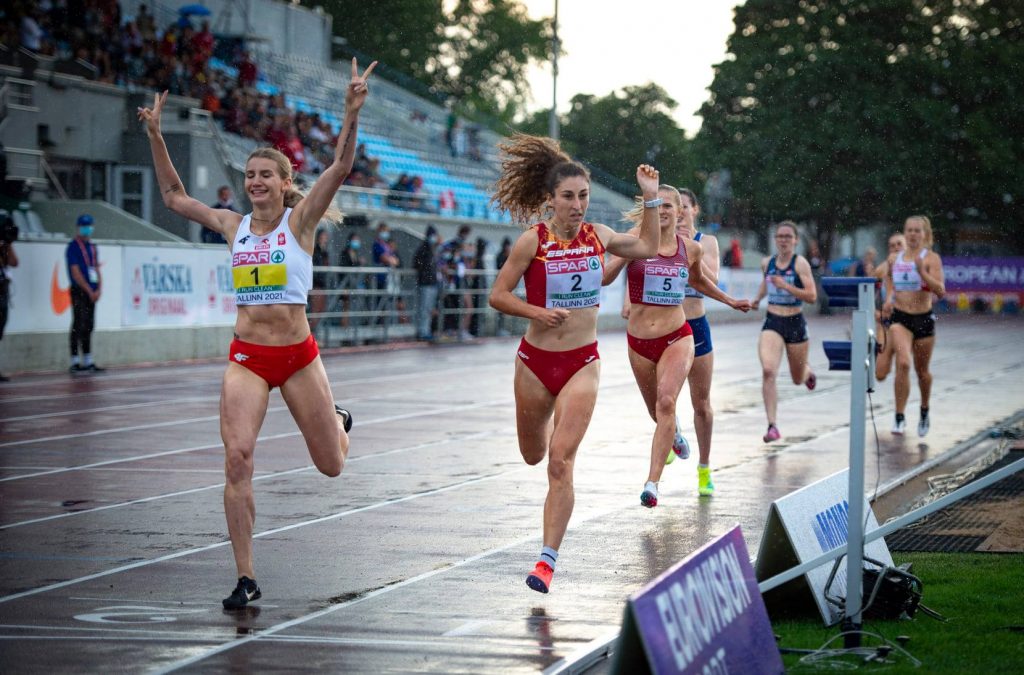
After the event, Claudia said: “Before coming to this competition, I was hoping to fight for 4th, maybe 3rd place if everything was perfect. So being second is just a dream come true. In Arona, it was a very good mark, but the long jump and the javelin throw was awful, so I knew I was ready to do better. My coach was keeping count, talking to me calmly: but on the inside, I was like “Come on Claudia, come on” and when I did the third attempt in the javelin and it was good, I was super relieved. In that moment I almost throw up, and I was so nervous!”
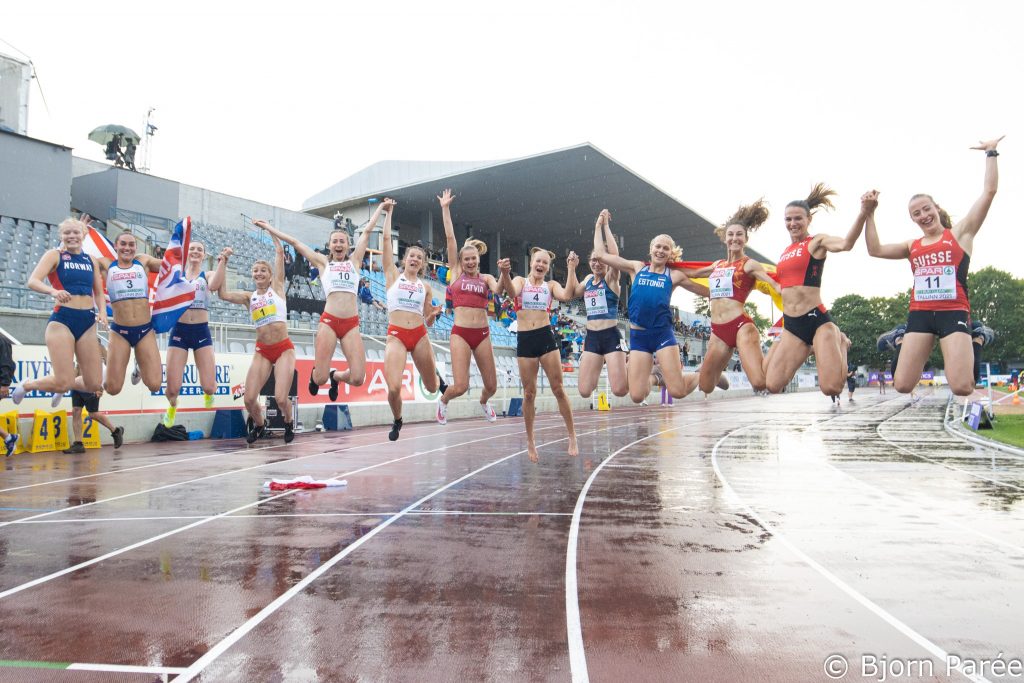
Kristine Blaževica finished 5th in a PB of 6007, after a long NCAA season and said: “I was really happy to get here, because I knew it was my last meet of the season, and I was excited to do my best. I was also pursuing the goal of getting 6000 points. So, I did it, and it’s a nice way to end my season. Of course, I’m really excited about next year and the World Champs in Eugene because I already competed there and so I know the track. But I’m also looking forward to the Olympic Games in 2024 I’m also really excited to compete in this age group in two years’ time because right now I’m the youngest one!”
MULTIEVENTERS DOING OTHER THINGS
Away from the decathlon and heptathlon, multieventers did other things brilliantly: Simon Ehammer annihilated the opposition to win long jump gold with 8.10m; Louise Maraval ran a 4x400m leg to help win silver for France, along with Agathe Guillemot; Holly Mills similarly ran a leg for Team GB in the 4x400m to finish 5th, and Jan Austria’s Jan Mitsche ran a PB of 14.42 to come within 0.02s of qualifying for the 110m hurdles semi-final.

Ehammer leaping to gold (Marko Mumm) 
The champion (Bjorn Paree)
DECATHLON
100m
After the flooding and storms earlier in the week, the weather changed, and the temperature climbed and climbed to over 35 degrees. Even at 0945, as the 100m started, it was already 29 degrees. But everyone looked good, and everyone was fast.
In the first heat, Carl Af Forselles (Sweden) and Manuel Dias (Portugal) both ran 11.08, the latter a PB, with Antonios Andreoglou (Greece) 11.15 and Bruno Comin (Spain) his first PB of the weekend with 11.16.
In the second heat Edgar Campre (Portugal) was the fastest and took 100th off his PB with 10.85 followed by Dario Dester (Italy) 10.97 and Angelos Andreoglou (Greece) in a PB of 11.02.
And then in the third heat, everyone was under 11s, led by Finley Gaio (Switzerland) in 10.66, just 2 hundredths slower than his PB from Götzis. Svens Jansons and Roosen (Netherlands) were next in 10.80 and 10.85 respectively, Baptiste Thiery (France) equalled his PB in 10.90, and the favourite Andreas Bechmann (Germany) ran 10.91 and Gävle veteran Makenson Gletty (France) 10.92.
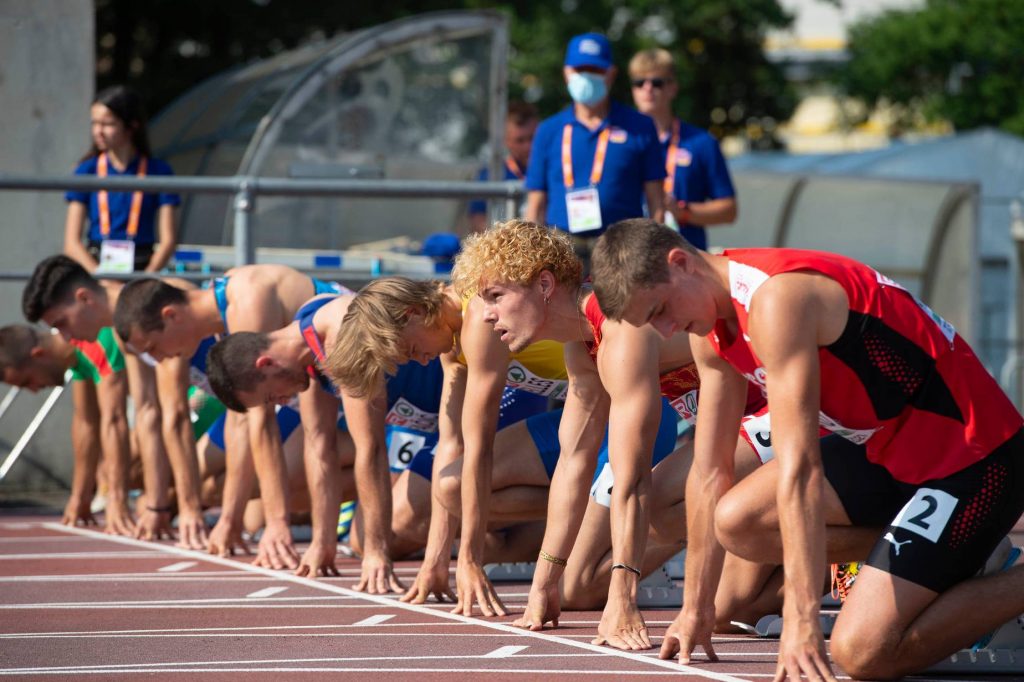
LONG JUMP
Typically, it all kicks off in Day 2 the pole vault – more on that later – but the drama started earlier in Tallinn, in the second event.
In Group A, Sven Jansons started the competition well, with a first-round jump of 7.45, just one cm short of his PB. In the second round he went onto jump a lifetime best, 7.50. Nils Laserich delighted himself with a 20cm+ PB with his first jump, 7.58. Group B was a little breezier, and Sven Roosen’s 7.44m jump benefited from a 2.7m tailwind. The wind dropped to allow Baptiste to twice legally exceed his PB with jumps 0f 7.14 and 7.15, and likewise Bruno Comin with his second PB in 2 events, 7.33m.
But back in Group A, Andreas Bechmann was having issues. In his first attempt, he tripped on the runway just a step in front of the board and landed face down in the pit. His second attempt a few minutes later was also a no-jump. Time to play it safe or, at least, that was the plan. He adjusted his marker and took off down the runway. It was close on the board, really close. It took a few moments for the officials to inspect the plasticine and make a judgement. Moments which felt like hours.
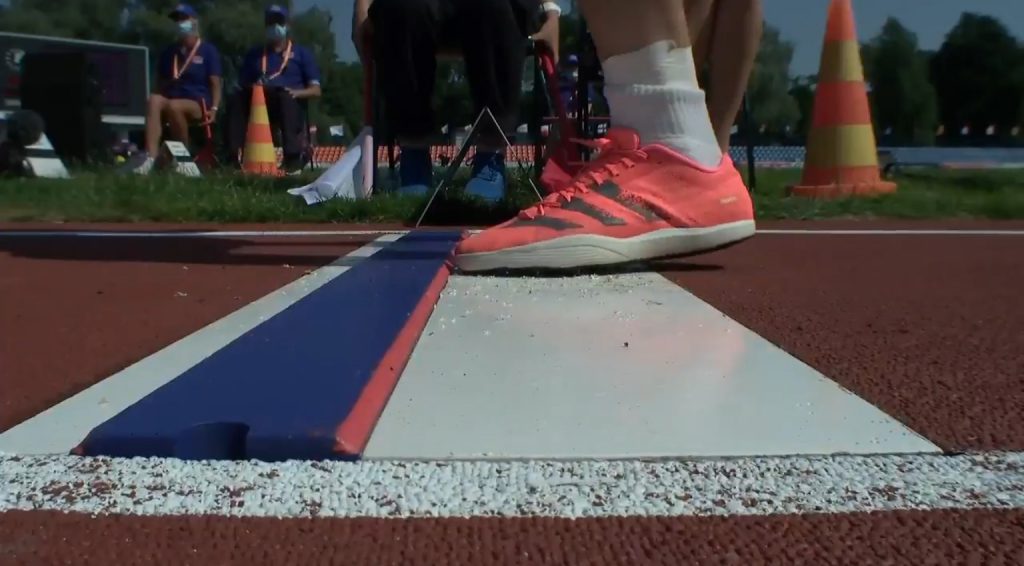
Then good news, a white flag.
But not only was it legal, it was massive. An Ehammer-esque 7.72, with just millimetres to spare on the board.
After 2 events:
- Gaio 1893
- Bechmann 1871
- Jansons 1841
- Roosen 1814
- Laserich 1802
SHOT
Onto the shot, with some big, big throws. The biggest of all was from Makenson Gletty. He was the first over 15m, throwing 15.06 in the first round. But he went out to an 85cm lifetime best in the second round, with a massive put of 16.36. That moved him up into second place overall. And the other big throw came from Bechmann, who had gone over 15m for the first time only a few months earlier in Götzis. First round was a solid 14.86, second round a foul, but then in the third round he threw a 43cm personal best of 15.81.
Both Nils Laserich and Finley Gaio experienced issues with the validity of their throws, challenging attempts that were called as fouls – Gaio’s Velcro strap on his shoe being cited as the cause of his foul in the second round. His best ended up only 11.99 in the 3rd round, while Laserich achieved 14.25 in the second.
But the big throws continued, with lifetime bests for Sven Roosen (14.75, previously 14.21) and Fran Bonifačić of Croatia with 14.59; and a few metres behind also for Switzerland’s Fabian Amherd (13.27), Manuel Dias (12.74), Antonios Andreoglou (13.44) and Baptiste Thiery (11.90).
Unfortunately, Carl Af Forselles was unable to start the third event after the long jump, but incredibly he was the only athlete unable to finish, although it came close for a few others.
After 3 events:
- Bechmann 2711
- Gletty 2601
- Roosen 2588
- Laserich 2546
- Gaio 2499
HIGH JUMP
The stars of the show were Lorenzo Modugno and Nils Laserich. After Bechmann called it a day at 2.02 in Group A, Modugno had his own rowdy and resplendent “Little Italy” congregated behind him on the bend at the Kadreorg Stadium, cheering as he went on to clear 2.05 and then a lifetime best of 2.08. In Group B, Laserich improved his PB twice, first over 1.93 and then over 1.96 at the third attempt. Sven Jansons jumped 1.99, Bruno equalled his PB with 1.96 and 6 men cleared 1.93: Amherd, Edgaras Benkunskas of Lithuania, Bonifačić, Thiery, Markus Rooth of Norway and Dario Dester of Italy.
After 4 events:
- Bechmann 3533
- Gletty 3315
- Laserich 3313
- Roosen 3275
- Jansons 3254
400M
The 400m was run at 19:20 in the evening, after a long and tiring day, made even more so by the constant 30 degree plus temperatures. But that didn’t stop almost two-thirds of the field running faster then ever before.
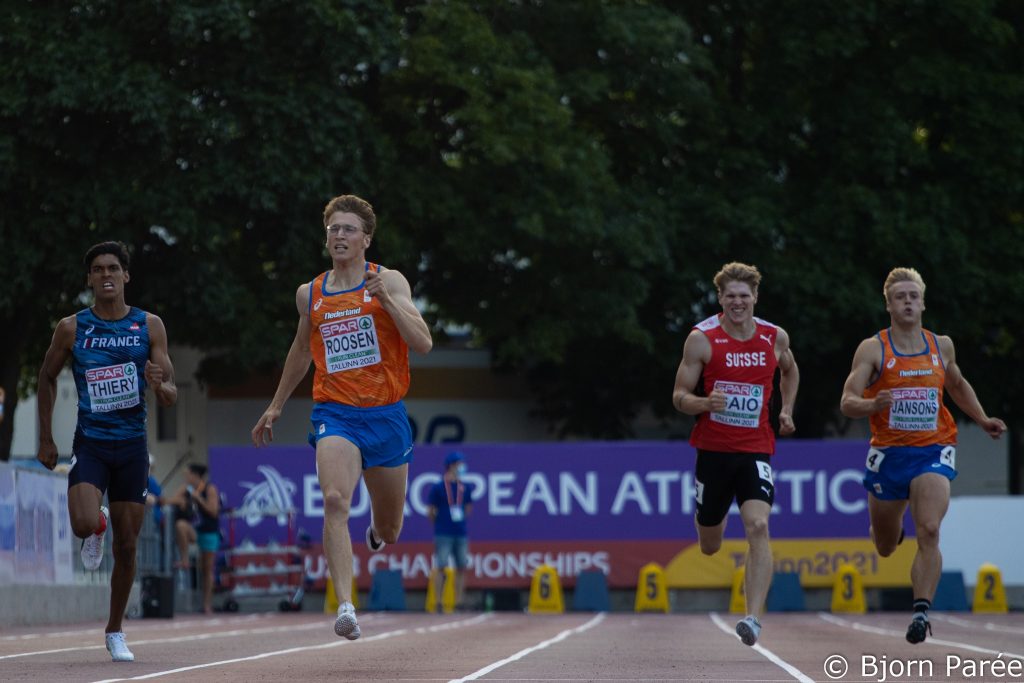
Sven Roosen was the fastest of them all in 47.27, followed by Bechmann 47.90, Dester 47.93, Thiery 48.00, Laserich 48.03, Gaio 48.49, Jansons 48.54, Benkunskas 48.74 and Amherd 48.88. PBs for all of them except Bechmann and Gaio, and many more in the heats around them. Unfortunately, Angelos Andreoglou was disqualified for a lane infringement, but that didn’t stop him continuing into Day 2.
At the end of Day 1
- Bechmann 4447
- Laserich 4221
- Roosen 4220
- Jansons 4137
- Dester 4117
While it was no surprise to have a German at the top of the standings on Day 1, it was perhaps more of a surprise to have two. Nils Laserich was delighted with his first day and described how he felt: “The 100m was a little bit slower than my personal best, but I felt fast and then I had the long jump and just…boom, 27cm further than 4 weeks ago, it’s amazing. I did a lot of upper body strength and then I just had a great shot put, and then the high jump was even better. The first time after two years again over 1.90cm, it was awesome and then 1.93 and 1.96.I couldn’t believe it, and then I thought the tank was empty – and now the 400m again a personal best. I now have 5 different coaches and they all put together such a great concept and I’m just happy to train with them. It’s all coming together in the right time, in the right place.”
110M HURDLES
The hurdles can sometimes be a little lacklustre, especially after a long hot Day 1, but that wasn’t the case on Sunday morning. Despite a modest – for him – 400m the previous evening, we saw a little Makenson Magic in the first heat of the hurdles, as he sped to 14.30, almost a second ahead of Christian Gundersen of Denmark and the rest of the field behind him, including Bechmann with 15.51.
Heat 2 was a thriller, as Markus Rooth took a massive chunk off his lifetime best of 14.80, running 14.61. Bruno Comin also reduced his PB to 14.68 in second, followed by Fran Bonifačić in 14.86 and a first-time sub-15 second run from Baptiste Thiery with 14.93.
And then came the masterclass in the third heat as Finley Gaio, second only to Damian Warner in Götzis, ran a championship best of 13.78. Sven Roosen was just 2 hundredths off his best in 14.22, and Dario Dester reduced his lifetime best by a tenth of a second to 14.33 in third. Sven Jansons was temporarily disqualified due to the officials’ questioning his trail leg over one of the hurdles, but the Dutch team’s protest was successful, and he was back in time for the discus, which was all very exciting.
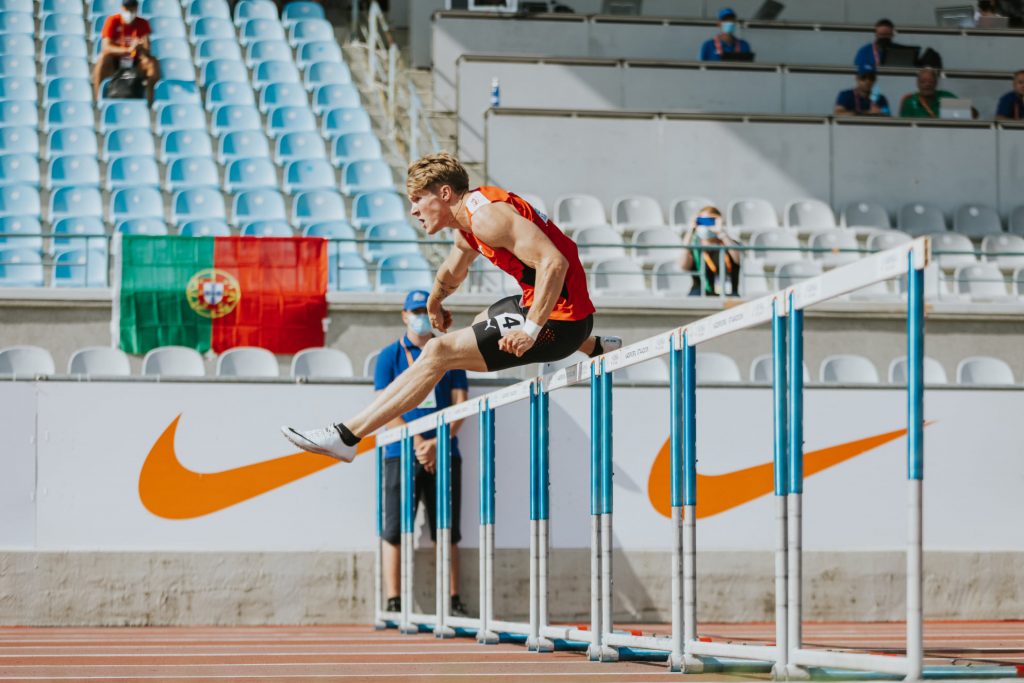
After 6 events:
- Bechmann 5236
- Roosen 5152
- Gaio 5075
- Dester 5049
- Laserich 4994
(Note that Jansons was still DQ at this point, otherwise would have been 5th with 5010)
DISCUS
At the end of Day 1, the 2019 European U20 bronze medallist Markus Rooth reflected on his first competition in the age group and missing out on the World U20s when they were delayed by a year from 2020. “I was in such good shape last year, and the junior equipment fit me a bit better than the 7kg shot put at least for now,” he said. “And I’m 2, almost 3 years younger than the oldest guys here. So, I think I’ve still got some years to improve.”
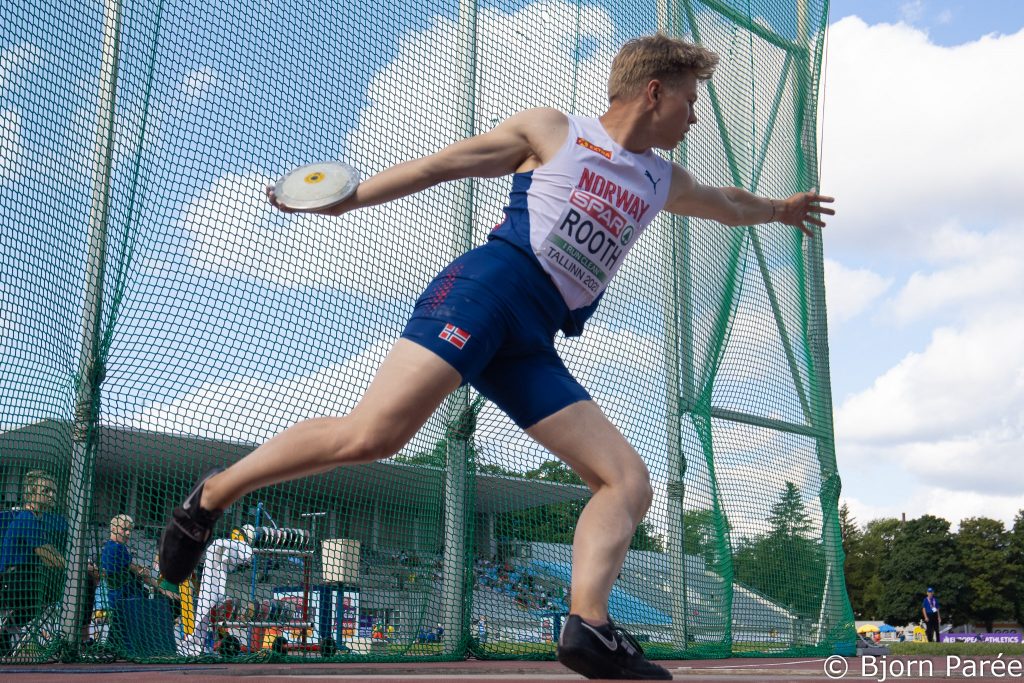
No sooner were the words out of Rooth’s mouth at the end of Day 1, than he proved himself more than capable of the transition to the senior event. After his hurdles PB, he then went onto secure the longest discus throw of the competition with 47.31, exceeding 47m for the first time. Bechmann also threw a lifetime best, of 42.51 and Bruno Comin also broke new ground, surpassing 40m for the first time with 41.64m in the first round, extending that to 42.08 in the second. The other 40m+ throws came from Benkunskas (43.01), Laserich (42.69), Bonifačić (42.35), Gletty (42.03) and Sven Roosen (41.97).
After 7 events Bechmann and Roosen had started to pull away, but it was impossibly close between 3rd and 8th: only 65 points separating Laserich in 3rd (5713) from Jansons in 8th (5648) and Dester, Gletty, Gaio and Rooth all lined up in between. Most of those names would expect to be in the mix, while Laserich was having the decathlon of his life. But the pole vault was going to shake everything up.
After 7 events
- Bechmann 5952
- Roosen 5857
- Laserich 5713
- Dester 5693
- Gletty 5692
POLE VAULT
In any decathlon pole vault, there are some things on which you can always rely:
- someone needing 3 attempts at their opening height. CHECK.
- someone setting a fabulous lifetime best. CHECK.
- a rogue gust of wind blowing the upright over and lifting the mat like a giant bouncy castle. Er, check?
- The equal 6th-best vault ever in a decathlon over 7000 points and the same height as won bronze in the individual pole vault. Excuse me?
The hardest working man in the competition was Edgaras Benkunskas, who entered the competition at 3.80, requiring 3 attempts (check) and then jumping at 3.90, 4.00, 4.10, 4.20, 4.30, 4.40. 4.50 and 4.60, before finally bowing out with three failures at 4.70, just 5cm away from his lifetime best.
At the other end of the scale, Baptiste Thierry had to wait over 2 and half hours before taking his first vault. He finally came in at 5.00m – with only Dario Dester and Markus Rooth left in the competition at that height – and cleared that easily. That moved him from 12th to 9th.
He then had 2 jumps at 5.30, clearing at the second attempt. That moved him from 9th to 5th, overtaking Gaio.
He cleared 5.50 first time. Fifth to 4th, overtaking Rooth.
And then, at the third attempt, he cleared 5.60. That placed him equal with Erki Nool and Aleksandr Averbukh on the all-time decathlon pole vault list. and moved him into second place.
Dario and Markus both had strong vaults, only going out at their PB heights of 5m and clearing 4.90. Both Bonifačić and Comin set lifetime bests at 4.80, Fran’s previous best being 4.70 and Bruno’s 4.60.
A little earlier, in a stadium that had experienced everything from thunder and lightning, to floods, to 37-degree heat during the championships, Group A’s attempts at 4.70 had been delayed by a freak gust of wind. The rogue breeze threatened to lift the umbrellas shading the athletes, knocked over one of the uprights, and caused the mat to billow to the extent that it appeared to be on the point of lifting off and sailing into the Baltic like a dinghy.
As order returned to the arena, the leader Bechmann took his first jump at his opening height 4.80. The bar came down. He took his second attempt. The bar came down again. Suddenly we were back at the long jump, with the favourite on the brink of disaster. And this time there was really no room for a safety jump.
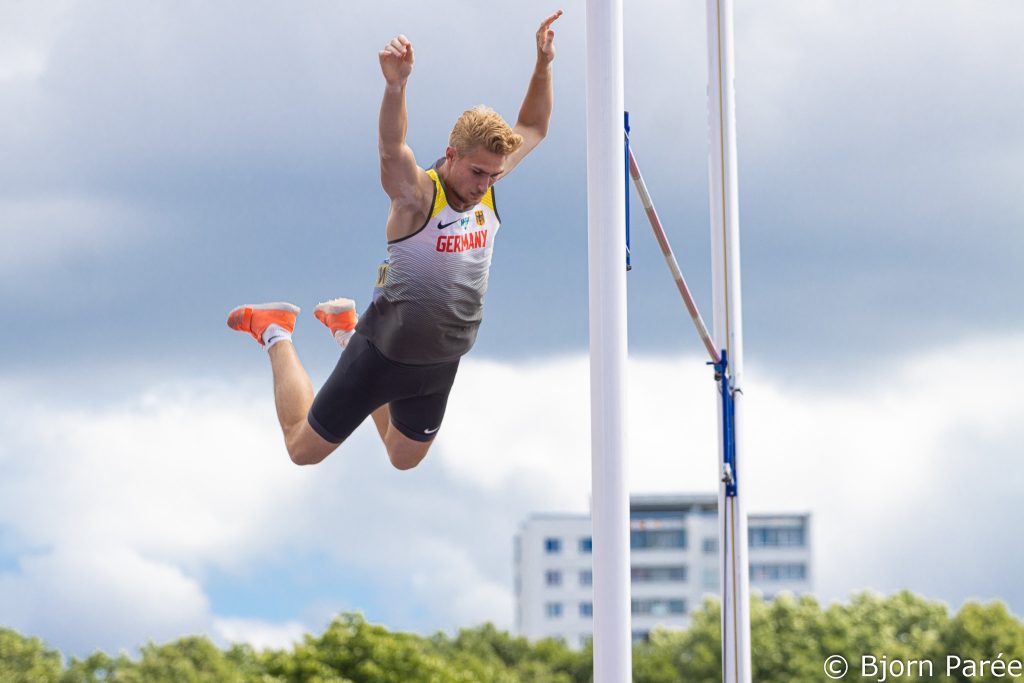
But he made it at the third attempt. However, he would go no further, and there would be no more room for error in the final two events, with a storm of challengers gathering.
After 8 events
- Bechmann 6801
- Thiery 6591
- Dester 6573
- Roosen 6559
- Rooth 6532
JAVELIN
Group A included Sven Roosen, who had been pushed down to 4th by Baptiste and Dario’s pole vault, and now had Markus Rooth breathing down his neck. Roosen delivered a strong 58.95, just a few metres down on his 60.75 PB.
Group B included Edgaras Benkunskas, by far the best javelin thrower in the field, with a best of 66.31. He unleashed a massive throw in Round 1 to exceed that and set a new lifetime best of 66.99. Bechmann had no uncertainty this time, with a solid 55.02 in the first round, which would be his longest of the day. Dario Dester also had a solid throw of 53.14, but Markus Rooth looked like he was going to break 60m, throwing 59.53 – just 27cm short of his PB – in the second round and another big throw in the third round, unfortunately outwith the sector.
But Thiery was the potential kingmaker in the javelin – could he capitalise on the huge progress he had made in the pole vault and shake up the medals? He threw 48.64 in the first round, a good effort just over 2m short of his 50m+ lifetime best.
After 9 events
- Bechmann 7464
- Roosen 7281
- Rooth 7263
- Dester 7208
- Thiery 7159
1500M
It was impossibly close, the tension so palpable that it caused a temporary power cut in the stadium. Bechmann seemed safe for gold but had flirted with disaster so many times already that nothing could be taken for granted. Roosen was the fastest among the contenders and seemed safe for silver and for an 8000+ score but could potentially also jump Bechmann if the German had any problems – like his lost shoe in Torun – in the 1500.
Rooth had 55 points on Dester, but there was little between them in 1500m ability. But remember Rooth’s blazing run in Borås in 2019 to knock 20 seconds off his best and claim bronze – could he hold off Dester to do the same in Tallinn?
And then there was Thiery. Only 49 points behind Dester, and another 55 to Rooth. His 4:16 PB dates from another age group, but he was still capable of running substantially faster than both the Italian and the Norwegian. Could he overhaul them for 4th and even bronze?
The 19 athletes – miraculously no more had dropped off during the two days – trudged towards the start line on the back straight, like men condemned to a long and painful death.
Fabian Amherd laughed in the face of the 10th event, taking almost 8 seconds off his lifetime best to cross the line first in 4:21.88. Lorenzo Modugno was just over half a second behind him in 4:22.47. Steaming down the track behind them was Sven Roosen, two and a half seconds faster than ever before in 2:25.38 to take silver. But how far behind was Bechmann?
Five seconds, ten seconds, fifteen seconds and then the German arrived, in 4:40.44, taking him to a new lifetime best of 8142 to Roosen’s 8056. Dester ran a PB of 4:32.53, as did Rooth in 4:36.30, and while the Italian closed the points gap to just 31 points, it wasn’t enough. Rooth took bronze in 7967, a national U23 record, and Dester 4th, also in a national U23 record of 7936.
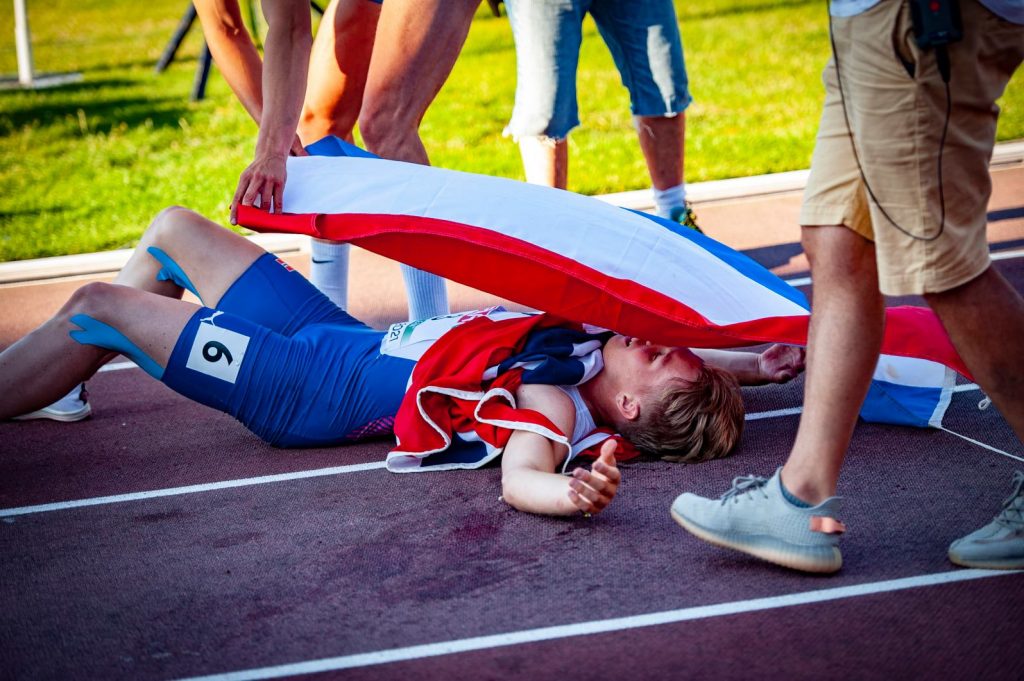
Thiery stayed in 5th but was also rewarded with a PB closing in on 8000 points, 7915.
In 6th place overall, Fran Bonifačić broke Joško Vlašić’s (Blanka’s father) 38-year-old national record with 7760.
And the final stride in a wonderful two days belonged to Makenson Gletty, heavily bandaged and limping round in 5:38.17 to finish 12th, embodying all that is special about decathlon.
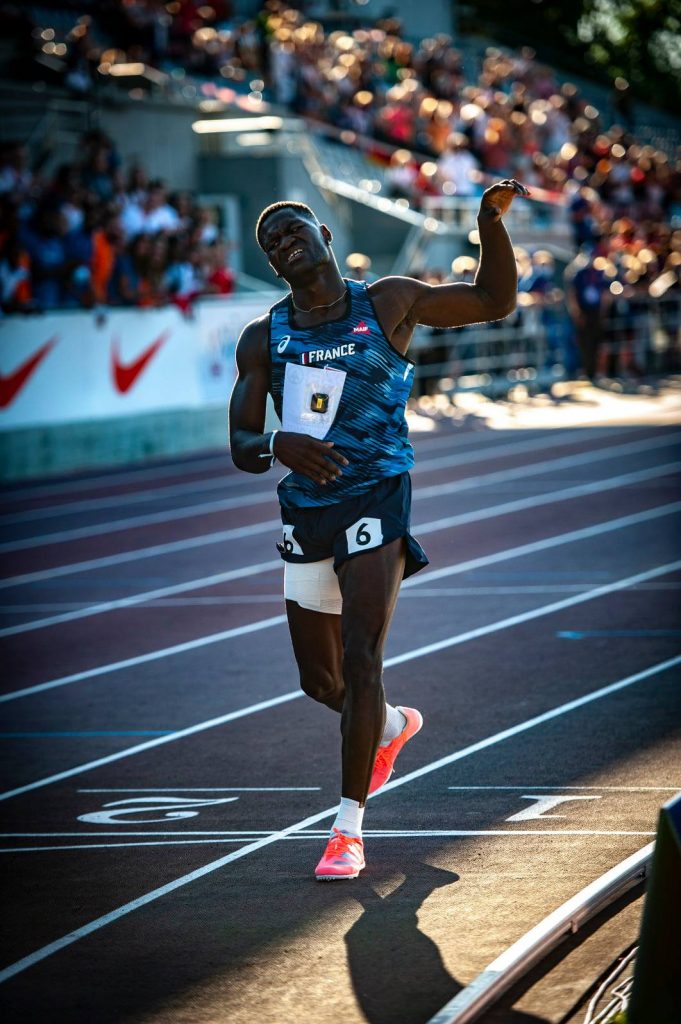
Spain’s Bruno Comin finished in 10th place and was delighted with his performance. “I’m really happy, it feels like all the hard work…I’m so happy I can’t express myself. I got injured in the high jump [in Arona] and from Arona to here I didn’t even train, no jumps, I just took it easy to be able to perform here. And I did, and I’m happy about that. For next year I want to qualify for the European Championships and have fun there. And then the following year, whatever comes.”
And after just missing out in a medal at the European U18 Championships in Gyor a few years ago, the Netherlands’ Sven Roosen was over the moon with a medal in his first year in the U23 age group. ”I’m extremely happy, to score a PB in the circumstances were really good. My 100m into a headwind was really good, and it was really warm, so I woke up a little more tired than normally – but today had so many good results, and then to come away with a PB in the 1500 and 8056…that’s an amazing score for a first year. I had a really good corona season where we could do some test competitions at our national training centre and now, I’m training under Ronald Vetter, together with Pieter Braun, Anouk Vetter, Rik Taam – it’s an amazing training group. I love my teammates and they played a big part in this silver medal, my first decathlon medal. I’m just really happy.”
The gold medallist Andreas Bechmann talked about his performance, and the trend sweeping the German decathlon team: “The long jump was a little more anxious than I would have liked, but then shot put – it’s my newfound love this season. In Torun I putted 13.80, and that was not even that bad. And now constant 15m – even my bad throws are high 14. I am not the strongest guy in the field, but somehow, it’s working. And then the second throw…if it had been 16m that would have been fun because Nils Laserich would have gone blond as well, so I’m a little bit sad. I didn’t plan to be blond here…but my teammate Jannis Wolff started it. And I said that if I become European Champion…then Kai Kazmirek will be blond in Tokyo!”
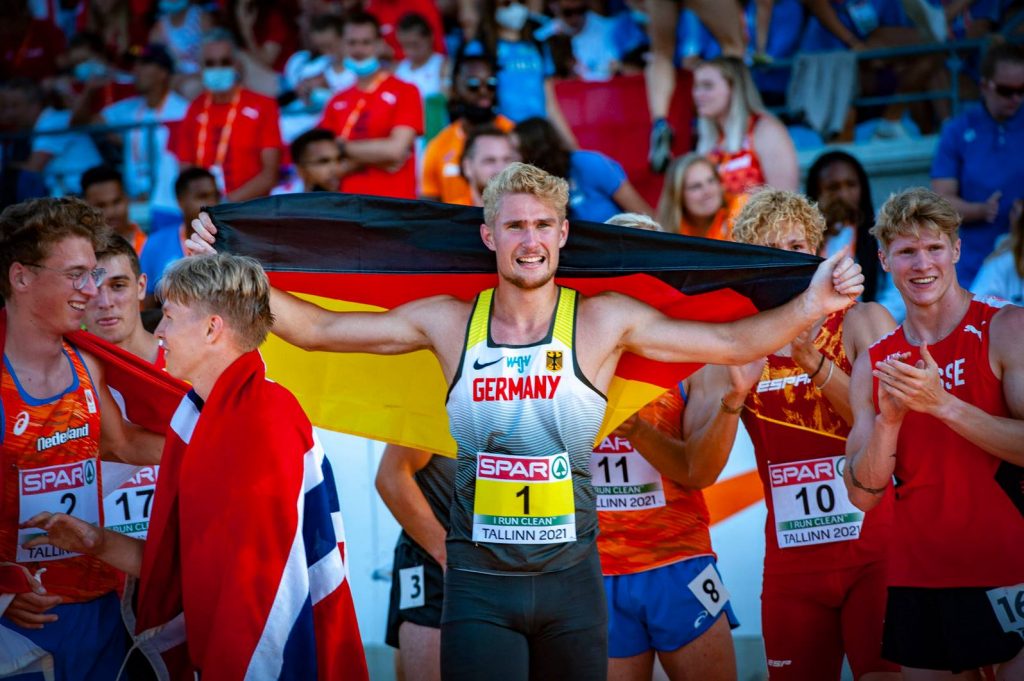
Bechmann continued, “In high jump, I have a bone bruise in my foot and in Götzis it was so bad that I had to quit. In Ratingen it was so bad that I thought about quitting a lot. I thought about quitting here too, but I think I learned a lot. Decathlon is Zehnkampf in German, which means “ten-fight” and I think that’s a perfect name for our event. Because it’s always a fight with yourself. I’m not the best performer mentally and therefore I try my best to learn from the best – from Niklas Kaul, from Kai Kazmirek and from my teammate Jannis who’s like the perfect decathlete there could be from the mindset perspective. He’s just so crazy motivated, always focused – emotional but in a good way.”
“And I think I showed the potential that, when I’m not injured, I can score 8500 points.”
